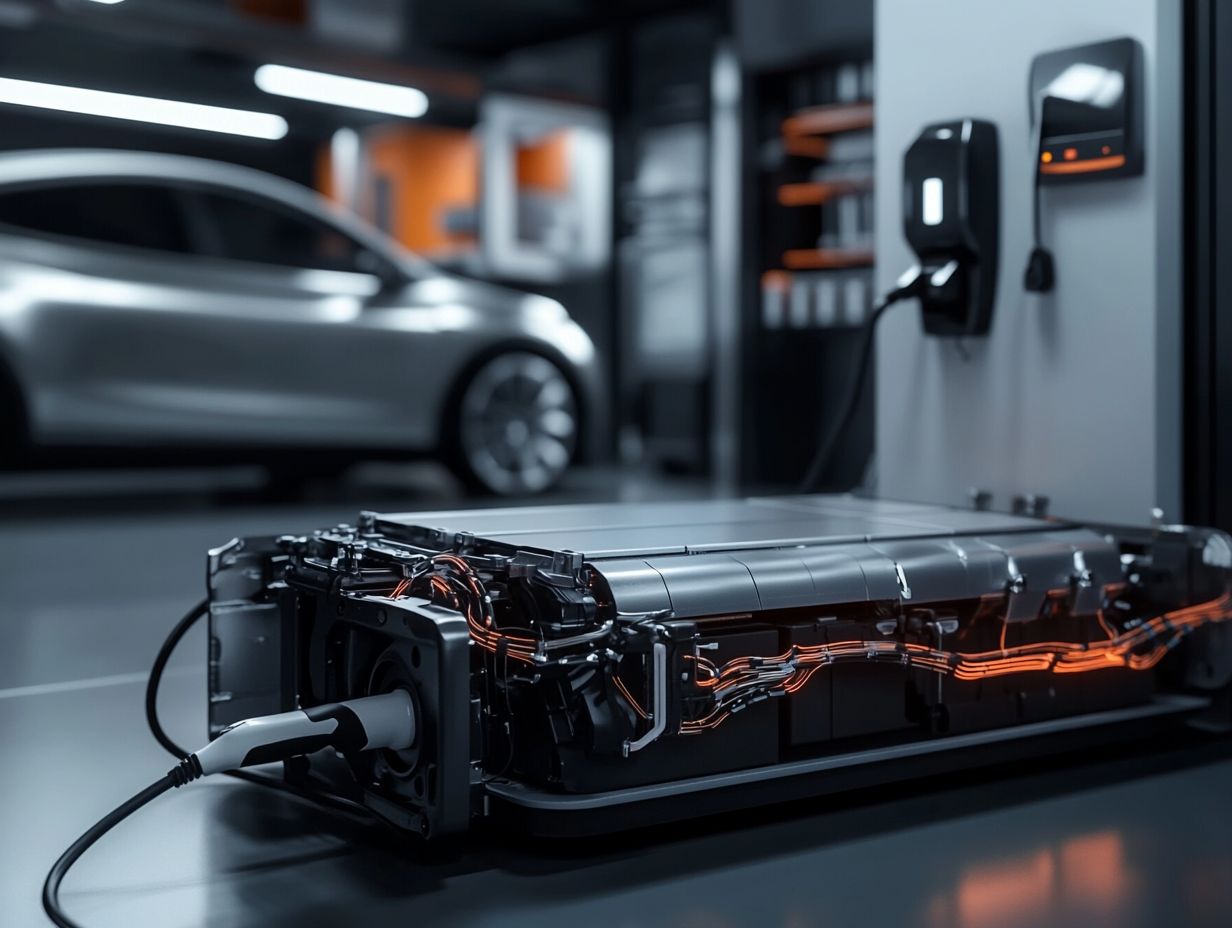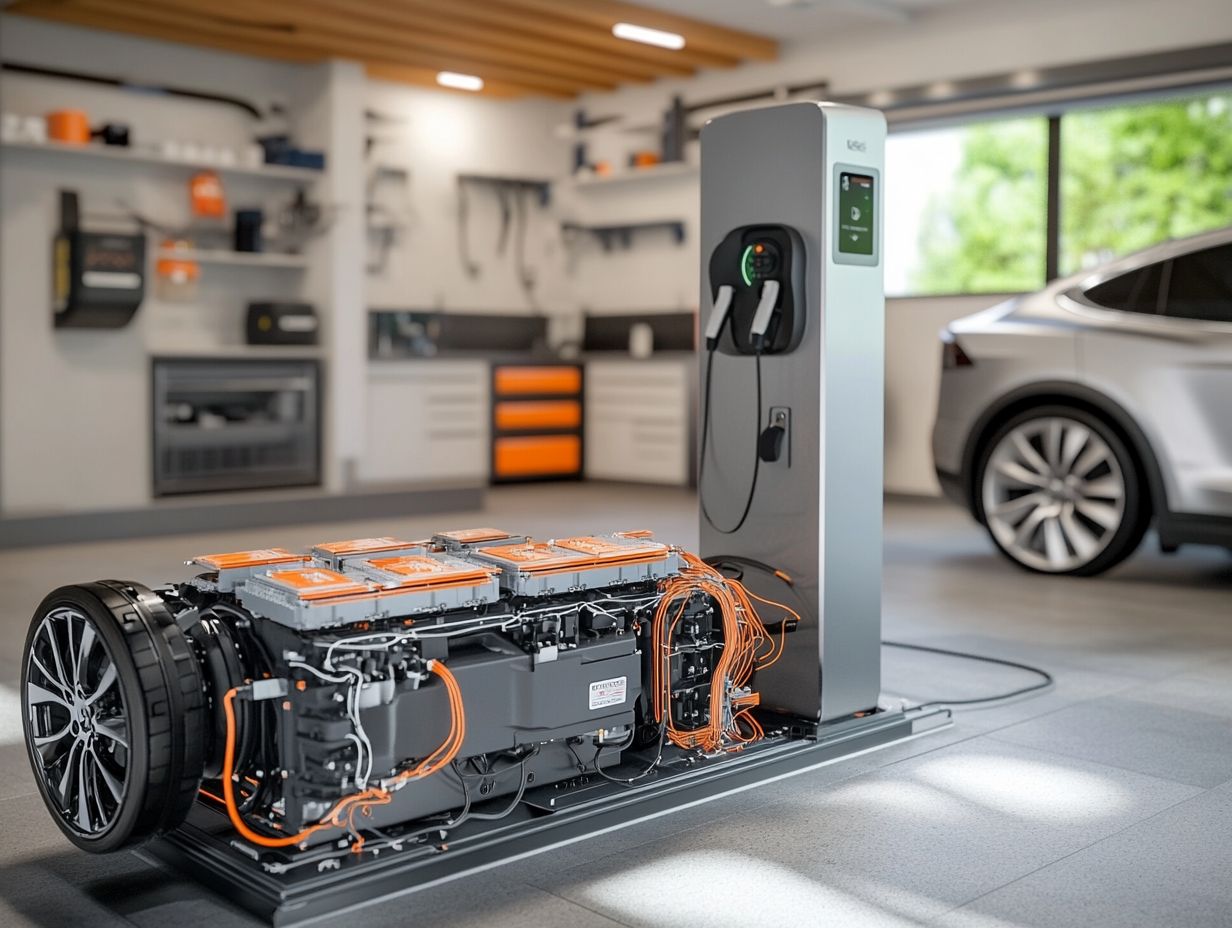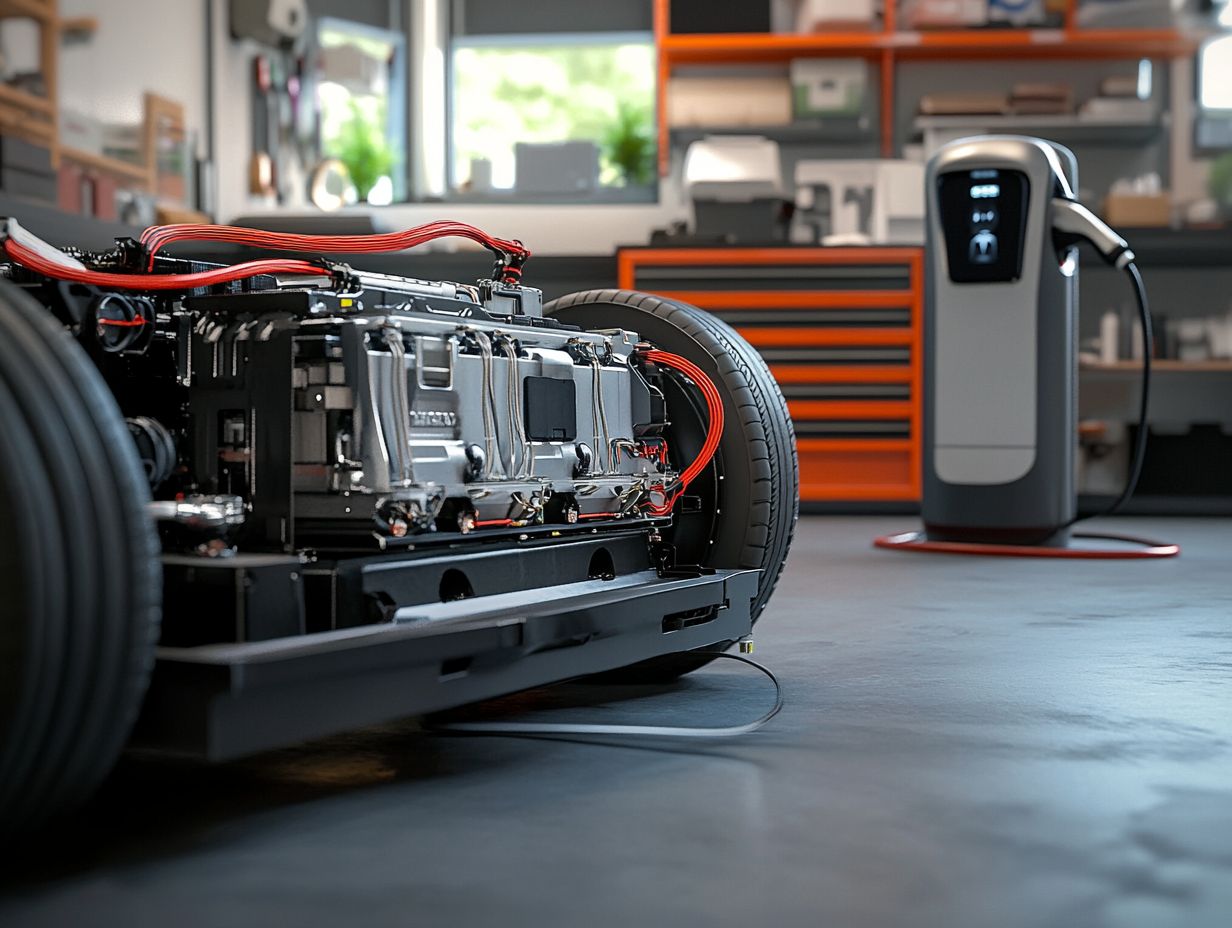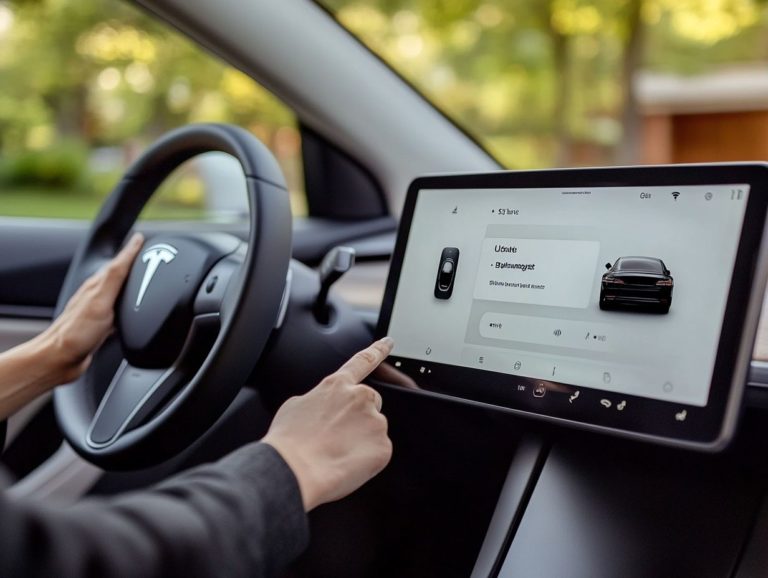Understanding EV Battery Lifespan and Care
Electric vehicle (EV) batteries are the heart of your EV s charm. Understanding how long they last and how to care for them is vital to unlocking peak performance and durability.
This article delves into the essentials of EV batteries. It highlights the factors that affect their lifespan and the warning signs of degradation you should be on the lookout for.
You ll discover effective charging techniques and maintenance tips designed to prolong your battery s life. We also provide guidance on when and how to replace it, considering both financial and environmental impacts.
Get ready to discover how to keep your EV performing at its best for many years ahead!
Contents
- Key Takeaways:
- What is an EV Battery?
- Factors Affecting Lifespan
- Signs of Battery Degradation
- Ways to Extend Battery Lifespan
- Replacing an EV Battery
- Costs and Considerations
- Frequently Asked Questions About EV Batteries
- What is the average lifespan of EV batteries?
- How can I extend the lifespan of my EV battery?
- Is it necessary to charge my EV battery to full capacity every time?
- What is the best way to care for my EV battery during winter?
- Can I replace my EV battery when it reaches the end of its lifespan?
- Are there any warranties or guarantees for EV battery lifespan?
Key Takeaways:

- Regularly monitor your EV battery’s health to catch signs of degradation early. This can help prolong its lifespan and avoid costly replacements.
- Proper charging techniques, such as avoiding extreme temperatures and limiting fast charging, can significantly extend the lifespan of your EV battery.
- Knowing when and how to replace your EV battery is crucial for cost-effectiveness and minimizing your environmental impact. Consider factors like financial cost and sustainability when making a decision.
What is an EV Battery?
An EV battery, or electric vehicle battery, is a pivotal component of electric vehicles (EVs). These batteries typically harness lithium-ion chemistry for efficient energy storage. Designed to deliver optimal energy density, these batteries ensure that electric cars can achieve impressive ranges while keeping weight to a minimum. This is crucial for vehicle performance.
As the electric vehicle industry expands, it becomes essential for eco-conscious drivers and enthusiasts alike to comprehend the various battery types and their distinctive features.
Consider the different types of EV batteries, such as lithium iron phosphate (LiFePO4) and nickel manganese cobalt (NMC). These highlight the diversity in construction and chemical composition. Lithium iron phosphate boasts enhanced thermal stability and longevity, making it ideal for urban driving scenarios. On the other hand, nickel manganese cobalt strikes a balance between performance and energy density, making it a solid choice for long-distance journeys.
These factors significantly influence both the efficiency and sustainability of electric vehicles. Higher energy densities allow batteries to store more power without adding unnecessary weight, thereby improving both range and efficiency.
As innovations in battery technology continue to unfold, understanding battery chemistry will be vital for drivers who aspire to contribute to a greener future.
Factors Affecting Lifespan
The lifespan of your EV battery hinges on a variety of factors. These include battery chemistry, charging cycles, temperature impacts, and overall battery health. All of these significantly influence aging. As an electric vehicle owner, it is essential to grasp how these elements interact to optimize battery maintenance and extend the life of your vehicle.
Battery chemistry is a key player in this equation. Lithium-ion batteries, which are the norm in EVs, have differing degradation rates depending on their material composition and design.
Charging cycles are another crucial aspect. If you frequently opt for fast charging, you might accelerate wear on the battery. Instead, keeping your charge between 20% and 80% can enhance its durability.
Temperature also plays a pivotal role. Extreme heat can speed up degradation, while cold temperatures might temporarily diminish efficiency, affecting your driving range. By adopting strategies such as utilizing thermal management systems and avoiding extreme charge levels, you can effectively combat battery degradation. This ensures a longer and more efficient lifespan for your vehicle.
Signs of Battery Degradation
Understanding the signs of battery degradation is essential for you as an electric vehicle owner. This knowledge ensures optimal battery performance and longevity.
Look out for indicators such as reduced battery efficiency, longer charging times, and a diminished range. These can all signify that your battery’s health is declining. Addressing these issues promptly is key to maintaining the performance and lifespan of your vehicle.
Start monitoring your battery health today for a smoother, longer-lasting ride!
Identifying and Addressing Degradation
Identifying and addressing battery degradation requires advanced battery management systems. These systems help manage and monitor battery performance by harnessing predictive analytics to effectively monitor battery health.
By leveraging modern technology, you can proactively manage your battery performance through informed charging practices and maintenance strategies.
These innovative systems offer a wealth of data on charge cycles, temperature fluctuations, and voltage levels crucial indicators of potential degradation. To further support you, various diagnostic tools are at your disposal, including smartphone apps that analyze battery status and professional service checks that evaluate performance metrics.
Regularly scheduled maintenance and adherence to recommended charging protocols can enhance battery longevity. Predictive analytics can help you anticipate issues before they escalate. By staying informed about your vehicle’s specific battery needs, you can ensure a more sustainable and efficient driving experience, ultimately extending the life of your electric vehicle’s battery.
Ways to Extend Battery Lifespan

Want to make your EV battery last longer? Try these strategies! You need to adopt deliberate approaches that include careful battery maintenance, optimal charging practices, and the implementation of effective battery solutions.
By paying close attention to your charge cycles and being mindful of the environmental conditions that impact battery health, you can significantly enhance the longevity of your electric vehicle’s battery. For more insights, refer to understanding EV electronics and maintenance.
Proper Charging Techniques
Using proper charging techniques is essential for enhancing battery efficiency and preventing premature aging. Understanding how to effectively utilize electric vehicle charging stations will lead to improved battery management and ultimately extend the lifespan of your EV batteries.
For optimal health, it s generally recommended to keep your charge levels between 20% and 80%. Regularly allowing the battery to dip below 20% can create unnecessary stress, while frequently charging it to 100% can degrade its capacity over time.
Fast charging is great for quick top-ups, but relying on it too often may generate excessive heat, negatively impacting battery performance. Conversely, a regular charging routine promotes slower, more balanced energy transfer, encouraging longevity.
By adopting these practices, you can significantly enhance your vehicle s efficiency and battery durability.
Maintenance and Care Tips
Effective battery maintenance and care are paramount for maximizing the longevity and performance of your EV batteries. Understanding best practices for EV battery care can help you manage factors such as climate conditions and your regular vehicle maintenance routines, significantly influencing battery health and enabling you to take proactive measures.
To achieve optimal battery health, it’s essential to monitor your battery charge levels, ideally keeping them between 20% and 80% whenever possible to prevent extreme degradation. Minimizing exposure to extreme temperatures is another key factor; by using climate control settings judiciously, you can alleviate potential stress on the battery.
Don’t overlook the importance of regularly checking for software updates, as these can optimize your battery management system and ensure efficient energy use. When planning longer trips, incorporating charging stops and avoiding rapid acceleration can further enhance your battery’s health over time.
By adopting these strategies, you can significantly prolong your battery s lifespan and ensure reliable performance, making the most of your electric vehicle experience.
Replacing an EV Battery
Replacing an EV battery is a pivotal decision for electric vehicle owners, shaped by various factors such as battery costs, warranties, and the long-term financial implications of battery maintenance.
It’s crucial for you to grasp when and how to replace the battery to ensure optimal vehicle performance and to maximize the overall value of your electric car.
Start implementing these tips today for a healthier, longer-lasting battery!
When and How to Replace a Battery
Knowing when and how to replace a battery is essential for you as an electric vehicle owner, as it directly impacts your vehicle s performance and reliability. Being aware of key indicators of battery degradation will enable you to make informed replacement decisions.
Monitor your battery health through your vehicle s diagnostic system. This helps catch early signs of wear before they become serious issues. Pay attention to decreased driving range, warning lights on your dashboard, or unusual charging times these could be red flags.
When it s time for a replacement, research various battery types that align with your vehicle s specifications. Choosing a reputable supplier is vital; you want to ensure that the battery guarantees performance and longevity. Consulting with a professional can enhance your understanding of the installation process to ensure your new battery is fitted correctly for best performance.
Costs and Considerations

The costs and considerations surrounding EV batteries encompass a range of important factors, from the initial battery costs to the financial implications of replacements, not to mention the environmental aspects, including recycling.
As the electric vehicle industry evolves, grasping these nuances becomes crucial for eco-conscious drivers and fleet operators. By staying informed, you can make more sustainable and economically sound choices in your journey toward electrification.
Financial Impact of Battery Replacement
The financial impact of battery replacement can be significant, with costs varying based on battery types and your preferences for specific vehicle makes. Evaluating long-term expenses and understanding battery warranties are essential steps in making informed decisions about your electric vehicle ownership.
Several factors can influence these prices, including the brand of your vehicle, the range of the battery, and the state of technology at the time of purchase. Warranties often play a crucial role in mitigating some of these costs, as they might cover a portion of battery replacement expenses if the battery fails within a specified timeframe.
Don t just think about the immediate costs consider the long-term savings! It’s vital to weigh not just the immediate financial implications but also the long-term value that comes from investing in a dependable battery. Understanding these dynamics helps you budget effectively and prepares you for future expenditures.
Environmental Considerations
When considering electric vehicles (EVs), it’s crucial to examine the environmental implications of their batteries, including their effects on fossil fuel emissions, battery recycling processes, and the overall sustainability of electric mobility. Evaluate these elements to see how your choices affect the planet.
Take, for example, lithium-ion batteries, which are the workhorses of electric vehicles. They significantly cut greenhouse gas emissions by about 50% over their lifetime compared to traditional gasoline vehicles. However, challenges abound. The sourcing of lithium and cobalt raises red flags regarding ecological damage and social issues within mining communities.
Effective recycling methods are very important. They minimize harmful waste and recover valuable materials essential for manufacturing new batteries. Look at successful recycling efforts in Norway it shows how we can move towards a sustainable automotive industry!
Frequently Asked Questions About EV Batteries
What is the average lifespan of EV batteries?
The average lifespan of EV batteries is typically 8-10 years or 100,000-200,000 miles depending on usage and environmental conditions.
How can I extend the lifespan of my EV battery?

Extend your EV battery’s lifespan by avoiding extreme temperatures. Regularly charge and maintain your battery, and for more insights, check out what is the lifespan of an EV battery? Drive your EV efficiently.
Is it necessary to charge my EV battery to full capacity every time?
No, you don t need to charge your EV battery to full capacity every time. For daily use, it’s best to charge your battery to about 80% to prolong its lifespan.
What is the best way to care for my EV battery during winter?
Care for your EV battery in winter by keeping it charged above 20%. Avoid leaving it parked in extreme cold for long periods.
Can I replace my EV battery when it reaches the end of its lifespan?
Yes, you can replace your EV battery when it wears out. Consider the cost and environmental impact before making a replacement decision.
Are there any warranties or guarantees for EV battery lifespan?
Most EV manufacturers provide warranties for their batteries, usually lasting 8-10 years or covering a specific mileage. Remember, actual battery lifespan can vary based on several factors.






